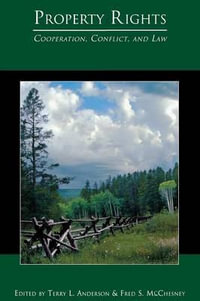Contents: Volume I Acknowledgements Introduction, Michael Heller PART I PRECURSORS A Commons 1. Aristotle, 'Discussion of Ideal States' 2. H. Scott Gordon (1954), 'The Economic Theory of a Common-Property Resource: The Fishery' B Anticommons 3. Augustin Cournot (1838/1960), 'Of the Mutual Relations of Producers' 4. Frank I. Michelman (1982), 'Ethics, Economics and the Law of Property' PART II COMMONS A Theory 5. Garrett Hardin (1968), 'The Tragedy of the Commons' 6. Elinor Ostrom (1990), 'Reflections on the Commons' 7. Thrainn Eggertsson (2002), 'Open Access versus Common Property' 8. Carol Rose (1986), 'The Comedy of the Commons: Custom, Commerce, and Inherently Public Property' B Solutions 9. Elinor Ostrom (1999), 'Coping with Tragedies of the Commons' 10. Hanoch Dagan and Michael Heller (2001), 'The Liberal Commons' 11. Shirli Kopelman, J. Mark Weber and David M. Messick (2002), 'Factors Influencing Cooperation in Commons Dilemmas: A Review of Experimental Psychological Research' PART III ANTICOMMONS A Theory 12. Michael Heller (1998), 'The Tragedy of the Anticommons: Property in the Transition from Marx to Markets' 13. Michael Heller (2008), 'The Tragedy of the Commons' B Economics 14. James M. Buchanan and Yong J. Yoon (2000), 'Symmetric Tragedies: Commons and Anticommons' 15. Francesco Parisi, Norbert Schulz and Ben Depoorter (2005), 'Duality in Property: Commons and Anticommons' 16. Francesco Parisi, Norbert Schulz and Ben Depoorter (2004), 'Simultaneous and Sequential Anticommons' 17. Giuseppe Dari-Matiacci and Francesco Parisi (2006), 'Substituting Complements' 18. Ben Depoorter and Sven Vanneste (2006), 'Putting Humpty Dumpty Back Together: Experimental Evidence of Anticommons Tragedies' Name Index Volume II Acknowledgements An introduction to both volumes by the editor appears in Volume I PART I THE NEW SPECTRUM A Linking Commons and Anticommons 1. Lee Anne Fennell (2004), 'Common Interest Tragedies' 2. Stephen R. Munzer (2005), 'The Commons and the Anticommons in the Law and Theory of Property' 3. Carol M. Rose (2000), 'Left Brain, Right Brain, and History in the New Law and Economics of Property' B The Economy of Property Forms 4. Harold Demsetz (1967), 'Toward a Theory of Property Rights' 5. Michael Heller (1999), 'The Boundaries of Private Property' 6. Henry E. Smith (2000), 'Semicommon Property Rights and Scattering in the Open Fields' 7. Henry Hansmann and Reiner Kraakman (2002), 'Property, Contract, and Verification: The Numerous ClaususA" Problem and the Divisibility of Rights' PART II APPLICATION OF ANTICOMMONS THEORY A Patents 8. Michael Heller and Rebecca S. Eisenberg (1998), 'Can Patents Deter Innovation? The Anticommons in Biomedical Research' 9. Carl Shapiro (2001), 'Navigating the Patent Thicket: Cross Licences, Patent Pools, and Standard Setting' 10. Fiona Murray and Scott Stern (2007), 'Do Formal Intellectual Property Rights Hinder the Free Flow of Scientific Knowledge? An Empirical Test of the Anti-Commons Hypothesis' 11. Rosemarie Ham Ziedonis (2004), 'Don't Fence Me In: Fragmented Markets for Technology and the Patent Acquisition Strategies of Firms' B More Intangible Property 12. Francesco Parisi and Ben Depoorter (2002), 'Fair Use and Copyright Protection: A Price Theory Explanation' 13. Thomas W. Hazlett (2005), 'Spectrum Tragedies' C Real Property 14. Gary D. Libecap and James L. Smith (2002), 'The Economic Evolution of Petroleum Property Rights in the United States' 15. Abraham Bell and Gideon Parchomovsky (2003), 'Of Property and Antiproperty' 16. Mark D. West and Emily M. Morris (2003), 'The Tragedy of the Condominiums: Legal Responses to Collective Action After the Kobe Earthquake' 17. Russell S. Sobel and Peter T. Leeson (2006), 'Government's Response to Hurricane Katrina: A Public Choice Analysis' Name Index
























